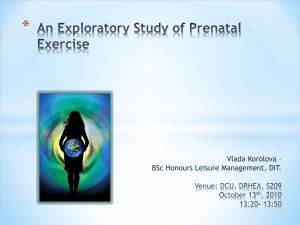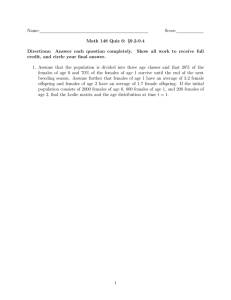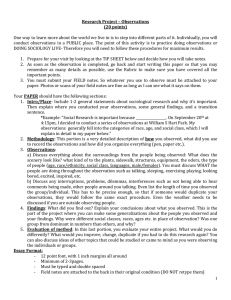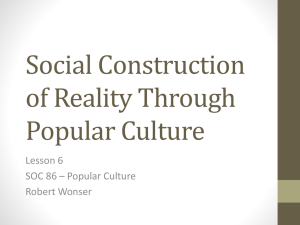Females Academics’ Progression Action Plan: 2009 – 2012
advertisement
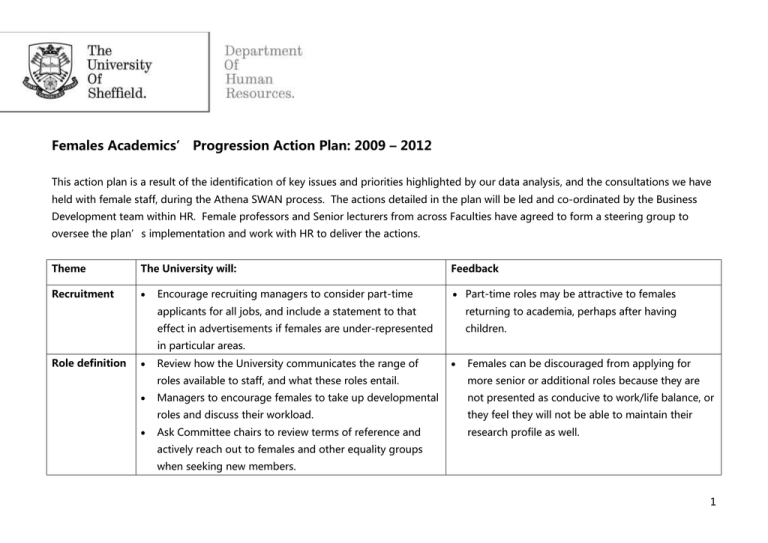
Females Academics’ Progression Action Plan: 2009 – 2012 This action plan is a result of the identification of key issues and priorities highlighted by our data analysis, and the consultations we have held with female staff, during the Athena SWAN process. The actions detailed in the plan will be led and co-ordinated by the Business Development team within HR. Female professors and Senior lecturers from across Faculties have agreed to form a steering group to oversee the plan’s implementation and work with HR to deliver the actions. Theme The University will: Recruitment Encourage recruiting managers to consider part-time Feedback Part-time roles may be attractive to females applicants for all jobs, and include a statement to that returning to academia, perhaps after having effect in advertisements if females are under-represented children. in particular areas. Role definition Review how the University communicates the range of Females can be discouraged from applying for roles available to staff, and what these roles entail. more senior or additional roles because they are Managers to encourage females to take up developmental not presented as conducive to work/life balance, or roles and discuss their workload. they feel they will not be able to maintain their Ask Committee chairs to review terms of reference and research profile as well. actively reach out to females and other equality groups when seeking new members. 1 Theme The University will: Feedback Ask faculties and departments to consider participation by senior women in management. Development Target communications to females, particularly at Lecturer Female-only training would be beneficial. Females recognise the value of a culture of support level, on the availability of female-only training. Consider adding female-only training sessions to the University’s portfolio of “bite-sized” training sessions for females on single issues. Work-life balance and flexible working Facilitate discussion amongst senior managers about how they can create and manage a flexible culture. in which teaching and administration are valued as Publicise good management practices and create and well as research, and where managers openly and manage stories of successful males and females who work actively support flexibility. flexibly. The career focussed support provided by the Raise awareness amongst managers of the University Women Academic Returners’ Programme (WARP) work-life balance/flexible working policies. is excellent and is both tangible and measurable. Continue to fund the Women Academic Returners’ Programme until 2012, and evaluate the scheme. Consider mentoring/coaching for women returners from maternity leave, including recipients of WARP funding. Raise awareness within departments of the positive impact of scheduling meetings within core business hours. Role Models Consider how we can best communicate the success of It is felt that having visible role models would be female academics across the UoS. beneficial for females at the beginning of their Consider with faculty PVCs how they can create academic career and at future stages. opportunities for women to network within their own departments and faculties and share experience and tips 2 Theme The University will: Feedback for success. Mentoring Roll-out a University-wide mentoring scheme for females from 2009. Mentoring would be welcomed by all staff, and the opportunity for a mentor would be particularly useful at transition points in a female’s career, for example, from Lecturer to Senior Lecturer. Networking Facilitate role-based networking events for females and Networks are valuable for staff at all stages of their males, focussing in the first instance on Lecturers careers, but particularly useful for female and male embarking on their academic career. staff at the beginning of their career and for Host a lunch with the Vice-Chancellor for female professors females at the same point in their careers. to share their experiences, and to discuss and review support for the progression of females to senior positions. Hold a second ‘SETM Symposium’ for women SRDS Review SRDS guidance and briefing sessions to ensure an emphasis on discussion about career development. Females noted that some may wait for ‘a tap on the shoulder’ before putting themselves forward for promotions or positions on senior University committees, etc. Promotion/ Progression Continue to monitor promotions centrally, by gender and should be more transparent, and provided at practice, and ensure that the information is provided by faculty level. Work with the faculties to provide workforce information which will inform business planning, and encourage FPVCs Data, particularly that relating to Promotions, other equality strands, to ensure non-discriminatory faculty. The promotions criteria are not felt to be gender neutral, and male only panels are unhelpful. Females, particularly those at Lecturer level, may to share data. spend a high proportion of their time teaching and Review/clarify promotions criteria to ensure gender consequently do not have the necessary research neutrality. output to gain promotion. 3 Theme The University will: Feedback Develop guidelines regarding gender balance on promotion panels. Develop typical profiles outlining what promotion panels will consider (Engineering) Work with FPVCs, promotion panel chairs, promotions officers and secretaries to ensure that unsuccessful applicants receive appropriate feedback. Increasing the profile of Host a programme of events in July 2009, to mark 50 years of female professors at the UoS. Females felt that having the opportunity to discuss issues affecting them in their careers was positive, issues affecting and they would welcome further opportunities to females do so. academics’ progression 4
